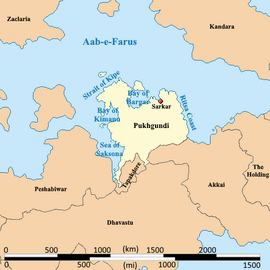Pukhgundi
Republic of Pukhgundi | |
|---|---|
|
Flag | |
 Location of Pukhgundi | |
| Capital | Sarkar |
| Largest largest city | Tarigar |
| Official languages | Pukhti, Burgundian |
| Demonym(s) | Pukhgundian |
| Government | Republic |
• President | Acabay Lodhi |
| Establishment | |
• Independence | 1811 |
| Area | |
• Total | 1,047,909 km2 (404,600 sq mi) |
| Population | |
• 2020 estimate | 42,600,400 |
• Density | 40.65/km2 (105.3/sq mi) |
| Currency | Common Middle Sea Florin (CMS ƒ) |
| Driving side | right side |
Pukhgundi, officially the Republic of Pukhgundi, is a minor-power sovereign country central in Audonia. It is neighbored by the Aab-e-Farus in the north, Tapakdore in the southwest, XXX in the south, and XXX in the southeast. It came to its modern iteration after Operation Kipling, in 1983 both geographically and politically. It is a constitutional republic with universal suffrage is praised for holding consistently open and fair elections in the Region. Pukhgundi is a member of the League of Nations, the International Red Cross and Red Crescent Movement, and many other international organizations.
Many scholars have criticized its governance and politics, arguing that it is merely a client of the Burgoignesc thalattocracy's economic and cultural might.
Etymology
Geography
History
Prehistoric era
Stone Age
Bronze Age
Iron Age
Classical Antiquity
WIP Gupta Empire-alike
Medieval Period
Main article: Oduniyyad Caliphate fighting against the Gupta then the Gupta's collapse and its a march of the Caliphate
Late Medieval Period
Early modern era
Colonization
Company rule
Great Rebellion of Slavery Bay
Late modern era
Contemporary era
Operation Kipling
Main article: Operation Kipling
Globalization
Government
Executive
Legislature
Local governance
Culture
Cuisine
Nepali food
Demographics
The people of Pukhgundi are predominately ethnically Pukhti Gorkhas.
Linguistic Demographics
Pukhti = Nepali
Religious Demographics
74% Hindu 19% Islam (43% Sunni, 42% Shia, 15% Sufi) 7% Christian (64% Calvinist, 29% Catholic, 7% Mormon)
